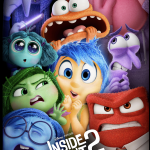When a construction worker unexpectedly joins a local theater’s production of Romeo and Juliet, the drama onstage starts to mirror his own life.
Chuck says:
When I was studying film at Columbia College in Chicago, lo so many years ago, I had a classmate who had a bit of a superiority complex. He knew everything. All you had to do was ask him. One day, our conversation turned to the films of Steven Spielberg, and he told me, with an air of disdain, that he didn’t like “Raiders of the Lost Ark.” He told me the Nazis hadn’t actually been in North Africa during the time the movie took place. Thus, with such a glaring error, he simply couldn’t be bothered with the film.
Of course, such nit-picking is silly where any movie is concerned. I’d be willing to bet that factual mistakes and lapses in logic can be found in every film that’s been made. It’s the nature of the medium, the viewer’s willingness to suspend disbelief the only reason any movie can be enjoyed.
Kelly O’Sullivan and Alex Thompson’s “Ghostlight” would be prime fodder for my old school chum and other sanctimonious audience members. It has its narrative flaws, and I would be the first to admit that key moments would likely never happen. And yet, I’m glad that I haven’t gotten so old and bitter that I take a hypercritical look at all that comes my way. If so, I would be robbing myself of gifts like those bestowed by this magical, sincere, moving motion picture.
O’Sullivan’s script is a tantalizing, and at times, vexing construction. We aren’t immediately made aware of all that’s amiss with the Mueller family, but it is readily apparent that a cataclysmic event has occurred that has torn them asunder. Dan (Keith Kupferer) is a construction worker who obviously has the weight of the world on his shoulders. Preoccupied at work, he’s reluctant to talk about what’s bothering him. His wife, Sharon (Tara Mullen), is unsteady as well, uncertain how to speak to her husband anymore, aware that one wrong word will likely set him off. Adding to their woes is their daughter Daisy’s behavior (Katherine Mallen Kupferer), the 15-year-old acting out at school, constantly suspended and on the verge of being expelled.
To reveal just what is wrong would be a disservice to O’Sullivan’s delicately constructed script, as well as anyone wise enough to give this film a chance. Surprisingly, the slow reveal is not frustrating but rather tantalizing, the tiny bits of information steadily dispensed, stoking our curiosity rather than breeding a feeling of being manipulated.
Of course, there’s the matter of the Shakespearean subplot at play that proves an engaging distraction.
Due to circumstances easier seen than explained, Dan is reluctantly roped into a community theater production of “Romeo and Juliet,” given the role of, wait for it…Romeo. How a middle-aged man would end up in this circumstance is a reach but within the logic of the film, it’s an acceptable occurrence. More importantly, it’s necessary in driving home the theme of how theater and other art forms can be vital in the healing process. As he dives deeper and deeper into the role, it proves to be a cathartic experience for Dan, his growing understanding of Romeo’s motivation and actions allowing him to come to terms with much that is bothering him. And once his daughter joins the cast, they find a way to communicate, healing the rift that’s grown between them.
That Kupferer, Mallen, and their daughter are cast as the family on screen give the Mueller’s interactions an added weight that proves invaluable. Their conversations are effortless, lived-in, the tension between them palpable, their interactions organic. The hurt and anger the characters harbor towards one another is obvious, but the trio is aware that the love they feel for each other can never be wholly obscured if the viewer is going to join them on the emotional roller coaster they endure.
Mueller has the most difficult assignment, giving a finely calibrated performance, one in which restraint is the key. The success of the film depends on the awkwardness he conveys, as well as the ability to communicate with the audience by doing so very little. Our empathy for Dan is immediate, making the scene in which he finally expresses his pain a cathartic, galvanizing moment, the culmination of one of the finest screen performances of the year.
In the world of theater, a ghost light is a single light left burning in a dark theater. Some contend its function is to chase away any impish spirits that might mar a production, others say it is to keep these ghosts happy. For Dan, it becomes an unlikely beacon, one that provides a path to salvation for him and his family. O’Sullivan’s “Ghostlight” is one of the finest films of the year, a movie that rewards the viewer for accepting its offbeat premise with a genuinely moving reminder that emotional salvation is possible.
4 Stars




